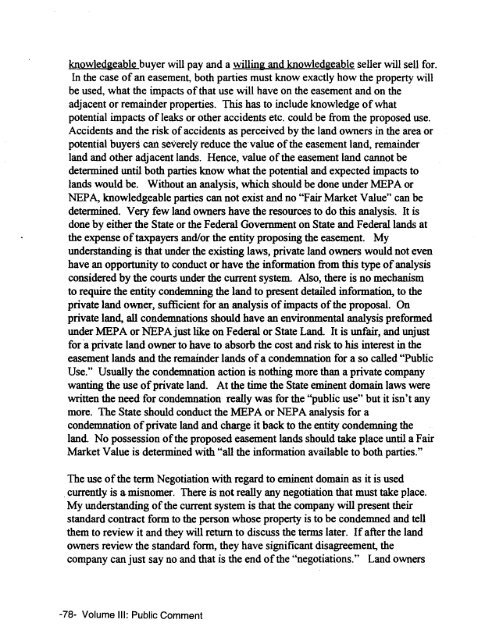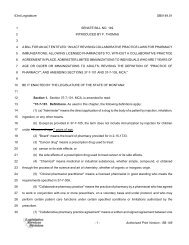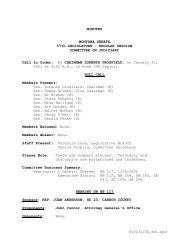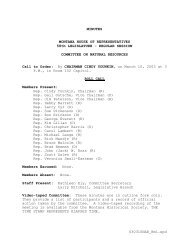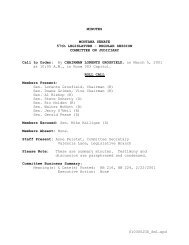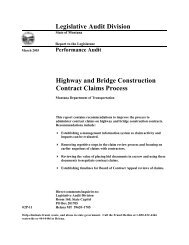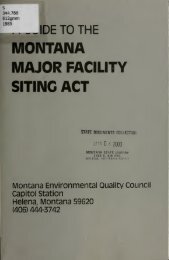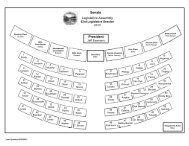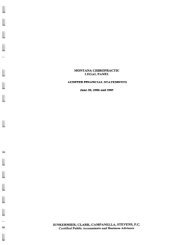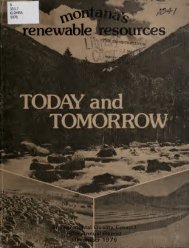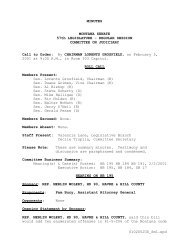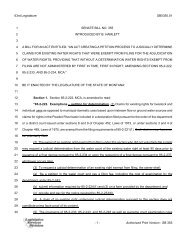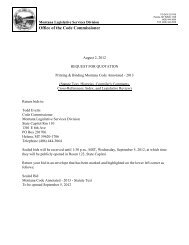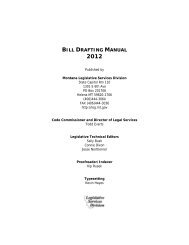Public Comment. Volume III - Montana Legislature
Public Comment. Volume III - Montana Legislature
Public Comment. Volume III - Montana Legislature
Create successful ePaper yourself
Turn your PDF publications into a flip-book with our unique Google optimized e-Paper software.
knowledgeable buyer will pay and a willing and knowledgeable seller will sell for.<br />
In the case of an easement, both parties must know exactly how the property will<br />
be used, what the impacts of that use will have on the easement and on the<br />
adjacent or remainder properties. This has to include knowledge of what<br />
potential impacts of leaks or other accidents etc. could be from the proposed use.<br />
Accidents and the risk of accidents as perceived by the land owners in the area or<br />
potential buyers can severely reduce the value of the easement land, remainder<br />
land and other adjacent lands. Hence, value of the easement land cannot be<br />
determined until both parties know what the potential and expected impacts to<br />
lands would be. Without an analysis, which should be done under MEPA or<br />
NEPA, knowledgeable parties can not exist and no "Fair Market Value" can be<br />
determined. Very few land owners have the resources to do this analysis. It is<br />
done by either the State or the Federal Government on State and Federal lands at<br />
the expense of taxpayers and/or the entity proposing the easement. My<br />
understanding is that under the existing laws, private land owners would not even<br />
have an opportunity to conduct or have the information &om this type of analysis<br />
considered by the courts under the current system. Also, there is no mechanism<br />
to require the entity condemning the land to present detailed information, to the<br />
private land owner, sufficient for an analysis of impacts of the proposal. On<br />
private land, all condemnations should have an environmental analysis preformed<br />
under MEPA or NEPA just like on Federal or State Land. It is unfair, and unjust<br />
for a private land owner to have to absorb the cost and risk to his interest in the<br />
easement lands and the remainder lands of a condemnation for a so called "<strong>Public</strong><br />
Use." Usually the condemnation action is nothing more than a private company<br />
wanting the use of private land. At the time the State eminent domain laws were<br />
written the need for condemnation really was for the "public use" but it isn't any<br />
more. The State should conduct the MEPA or NEPA analysis for a<br />
condemnation of private land and charge it back to the entity condemning the<br />
land. No possession of the proposed easement lands should take place until a Fair<br />
Market Value is determined with "all the information available to both parties."<br />
The use of the term Negotiation with regard to eminent domain as it is used<br />
. currently is amisnomer. There is not really any negotiation that must take place.<br />
My understanding of the current system is that the company will present their<br />
standard contract form to the person whose property is to be condemned and tell<br />
them to review it and they will return to discuss the terms later. If after the land<br />
owners review the standard form, they have significant disagreement, the<br />
company can just say no and that is the end of the "negotiations." Land owners<br />
-78- <strong>Volume</strong> Ill: <strong>Public</strong> <strong>Comment</strong>


